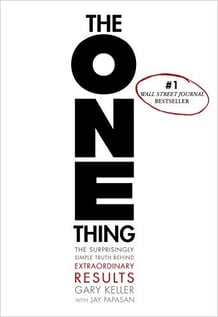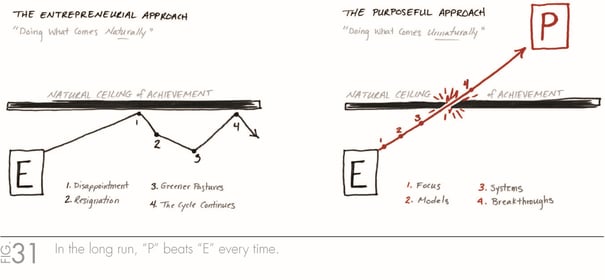Time blocking is critical to achieving your One Thing. We’ve discussed Time Blocking in Live for Productivity – Time Blocking and Why Your First Time Block is Vacation – Your One Thing...
 These concepts come from The ONE Thing: The Surprisingly Simple Truth Behind Extraordinary Results by Gary Keller, Jay Papasan.
These concepts come from The ONE Thing: The Surprisingly Simple Truth Behind Extraordinary Results by Gary Keller, Jay Papasan.
Keller insists that in order to achieve extraordinary results through time blocking it requires three commitments:
First, you must adopt the mindset of someone seeking mastery. Mastery is a commitment to becoming your best. So, to achieve extraordinary results, you must embrace the extraordinary effort it represents. As we’ll discover, not everyone is committed to making this kind of effort.
Second, you must continually seek the very best ways of doing things. Nothing is more futile than doing your best using an approach that can’t deliver results equal to your effort. You might consider this a dedication to learning, solving and planning. It’s the kind of continuous learning A players live by with their habit of reading 24 books a year.
Third, you must be willing to be held accountable to doing everything you can to achieve your ONE Thing. The vast majority of people are unwilling to accept this degree of accountability. Taking complete ownership of your outcomes, holding no one but yourself responsible, is the most powerful thing you can do to drive your success. In Keller’s opinion, it is probably the most critical of the three commitments.
When you live these commitments, you give yourself a fighting chance to experience extraordinary.
Let’s take a look at the three commitments and explore in depth a bit more of what they mean. We’ll be covering these over two blogs since the understanding of these commitments requires more than a cursory over view.
- FOLLOW THE PATH OF MASTERY
Since there is always another level to learn, mastery means you’re a master of what you know and an apprentice of what you don’t.
In Scrum: The Art of Doing Twice the Work in Half the Time by Jeff Sutherland, Sutherland acknowledges the need for achieving mastery. In Scrum, he dedicates a whole chapter to Happiness. In his view, working toward mastery is the key to achieving happiness. We’ll explore this chapter further when we begin delving into the ideas and concepts of Scrum. Suffice it to say, mastery and happiness are intricately connected. The coming blog will open your eyes to yourself and the people you manage.
In 1993, psychologist K. Anders Ericsson published “The Role of Deliberate Practice in the Acquisition of Expert Performance” in the journal Psychological Review. It is the benchmark for understanding mastery. This article debunks the idea an expert performer is gifted, a natural, or even a prodigy. We explored this in Leadership Lessons from: Julie & Julia – Talent is Overrated. Ericsson gave the first real insight into mastery and birthed the idea of the “10,000-hour rule.” His research identified a common pattern of regular and deliberate practice, over the course of years, in elite performers that made them what they were—elite.
As a reminder of the research, in one study, elite violinists separated themselves from all others by each accumulating more than 10,000 hours of practice by age 20. Thus, the “10,000-hour rule.”
Here’s where Keller brings the idea of Time Blocking and his emphasis on 4 hours a day together. Many elite performers complete their journey in about ten years, which, if you do the math, is an average of about three hours of deliberate practice a day, every day, 365 days a year. Now, if your ONE Thing relates to work and you put in 250 workdays a year (five days a week for 50 weeks), to keep pace on your mastery journey you’ll need to average four hours a day.
Sound familiar? It’s not a random number. That’s the amount of time you need to time block every day for your ONE Thing.
Here’s the deal: Expertise relates to hours invested. Michelangelo once said, “If the people knew how hard I had to work to gain my mastery, it wouldn’t seem wonderful at all.” Time on a task, over time, eventually beats talent every time.
Time blocking is essential to mastery, and, mastery is essential to time blocking. They go hand in hand—when you do one, you do the other.
“Nobody who ever gave his best regretted it.” —George Halas
- MOVE FROM “E” TO “P”
What exactly does moving from “E” to “P” mean?
The path of mastering something is the combination of not only doing the best you can do, but also doing it the best it can be done.
Keller describes this as: Continually improving how you do something is critical to getting the most from time blocking. It’s called moving from “E” to “P.” When we roll out of bed in the morning and start tackling the day, we do so in one of two ways: Entrepreneurial (“E”) or Purposeful (“P”).  No matter the task, all natural ability has a ceiling of achievement, a level of productivity and success that eventually tops out…..everybody in life has a natural ceiling for everything. Give some people a hammer and they’re an instant carpenter.
No matter the task, all natural ability has a ceiling of achievement, a level of productivity and success that eventually tops out…..everybody in life has a natural ceiling for everything. Give some people a hammer and they’re an instant carpenter.
I like the way Keller describes this, Give one to me (hammer) and I’m all thumbs. In other words, some people can naturally use a hammer extremely well with minimal instruction or practice, but there are others, like me, who hit their ceiling of achievement the moment they’re holding one. If the outcome of your efforts is acceptable at whatever level of achievement you reach, then you high-five and move on.
However, there’s a difference, Keller points out, when it’s your One Thing. But when you’re going about your ONE Thing, any ceiling of achievement must be challenged, and this requires a different approach— a Purposeful approach.
Highly productive people don’t accept the limitations of their natural approach as the final word on their success. When they hit a ceiling of achievement, they look for new models and systems, better ways to do things to push them through. They pause just long enough to examine their options, they pick the best one, and then they’re right back at it.
You don’t want to put limits on what you’ll do. You have to be open to new ideas and new ways of doing things if you want breakthroughs in your life. The path of mastery requires you to continually challenge yourself to do new things.
When you have the Purposeful mindset, you follow the simple rule that “a different result requires doing something different.” Keller emphasizes you should make this your mantra. You’ll achieve breakthroughs.
When you search for extraordinary results, accepting an OK Plateau or any other ceiling of achievement isn’t okay when it applies to your ONE Thing. When you want to break through plateaus and ceilings, there is only one approach—“P.”
When “E” is our only approach, we create artificial limits to what we can achieve and who we can become. If we tackle something with all “E” and then hit a ceiling of achievement, we simply bounce up against it, over and over and over. This continues until we just can’t take the disappointment anymore, become resigned to this being the only outcome we can ever have, and eventually seek out greener pastures elsewhere.
The Purposeful approach says, “I’m still committed to growing, so what are my options?” You then use the Focusing Question to narrow those choices down to the next thing you should do.
When you’ve done the best you can do but are certain the results aren’t the best they can be, get out of “E” and into “P.” Look for the better models and systems, the ways that can take you farther. Then adopt new thinking, new skills, and new relationships to help you put them into action. Become Purposeful during your time block, and unlock your potential.
We’ve explored two of these three commitments to time blocking. The next one, accountability, is critical. We’ll visit that next blog, along with Keller’s Big Ideas, from this chapter.






.jpeg?width=150&height=135&name=Hand%20with%20marker%20writing%20the%20question%20Whats%20Next_%20(1).jpeg)

